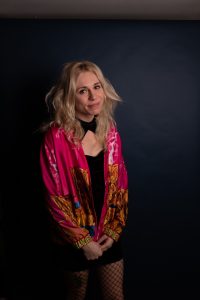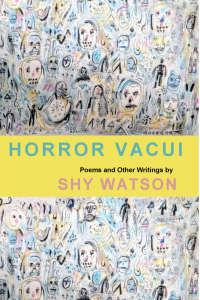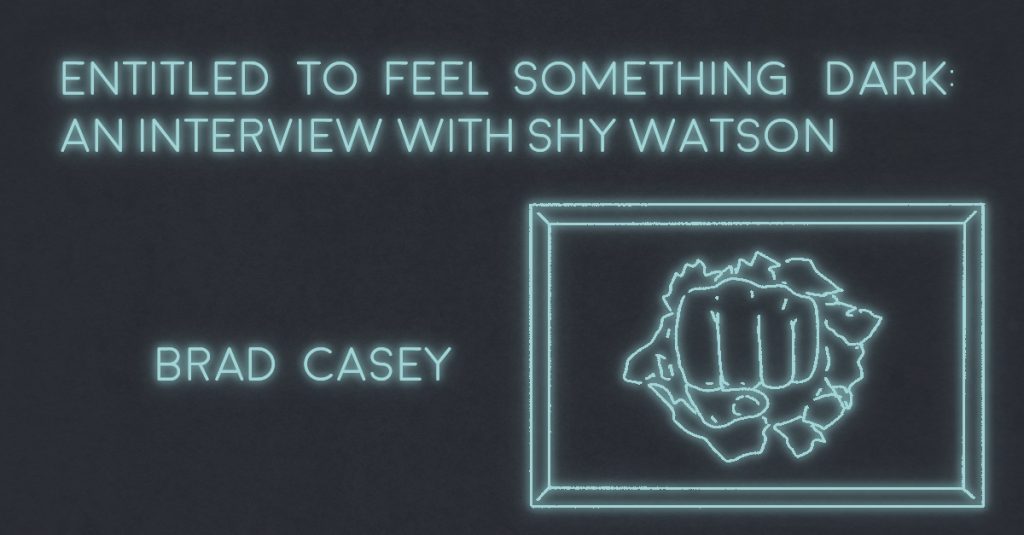 The first time I met poet and writer Shy Watson was after a reading in Brooklyn I’d organized in the summer of 2019. I’d heard of Shy for years, admiring what seemed to me to be a prolific amount of published work; within three years she had published dozens of poems, reviews, interviews, four chapbooks and a poetry collection. She was somehow involved in all the independent presses and magazines I admired: Metatron, Wonder, Bottlecap Press, Ghost City Press, Peach Mag, and Hobart as well as running and editing her own press: Blush Lit. And her work was deserving of attention. It’s present, it’s wanting, it has a quality about it like a compelling detachment, it shows the reader a world enfolding like a tour guide, a world morally ambiguous with sudden bursts of love, romance, nostalgia, and violence. A world fully her own. It’s hard to take your eyes away.
The first time I met poet and writer Shy Watson was after a reading in Brooklyn I’d organized in the summer of 2019. I’d heard of Shy for years, admiring what seemed to me to be a prolific amount of published work; within three years she had published dozens of poems, reviews, interviews, four chapbooks and a poetry collection. She was somehow involved in all the independent presses and magazines I admired: Metatron, Wonder, Bottlecap Press, Ghost City Press, Peach Mag, and Hobart as well as running and editing her own press: Blush Lit. And her work was deserving of attention. It’s present, it’s wanting, it has a quality about it like a compelling detachment, it shows the reader a world enfolding like a tour guide, a world morally ambiguous with sudden bursts of love, romance, nostalgia, and violence. A world fully her own. It’s hard to take your eyes away.
I’ve been lucky enough since then to come in and out of New York, to hear Shy read and share her work, to share dinner and wine together with mutual friends. And isn’t that a big reason we publish poetry? To share work and have fun with other poets? To talk with other poets? So when I heard Shy’s new book Horror Vacui (House of Vlad) was coming out I was eager to read it, to talk to her about her work. Horror Vacui is written in three parts. The first section, the longest, is made up of the Horror Vacui poems. The second, Waking Dreams, is a series of prose poems in which the world shifts and turns without warning. The third, Quarantine Diaries, is a down-to-earth accounting of personal daily events in New York within six weeks near the beginning of quarantine. Through the entire book is a desire for experience, a deep dive into the inner world, and an attempt to catalog a world outside the self that refuses understanding.
Below is the interview we conducted a few days before Christmas, 2020, as Shy got home from taking a COVID test.
****
Brad Casey: Hey! How are you? Where are you right now?
Shy Watson: I’m good! I’m back in Brooklyn but begrudgingly going to Missouri tomorrow (hence COVID test).
BC: How did the COVID test go? And how has Brooklyn been feeling?
SW: The COVID test was fine. I got it done at one of the walk-in clinics here in Brooklyn. People here either go to ModernMD or CityMD, and the two are across the street from one another which creates a kind of rival business effect, like Pat’s vs Gino’s. The line took three hours, but they brought out hand warmers. They said they’d call within an hour if the test was positive, so it looks like I’m in the clear. Usually, they email results regardless of what they are within 15 minutes but they said the computers are down. Brooklyn has been good, all things considered. I’ve basically just been spending time with my new boyfriend and working on novel edits! I’m very fortunate to live with roommates who I love during this time.
 BC: So I loved reading Horror Vacui. I’m wondering what were the conditions under which you wrote it. When and where did you write it? Was it all in Brooklyn? Was it all written this year?
BC: So I loved reading Horror Vacui. I’m wondering what were the conditions under which you wrote it. When and where did you write it? Was it all in Brooklyn? Was it all written this year?
SW: It was mostly in Brooklyn, yes. But the first twenty poems or so were written between Cheap Yellow‘s publication (February 2018) and one year ago. The majority of it was written in the past year, though. A few of them were written in Mexico, where I stayed for a month to work on a draft of my novel manuscript last January.
BC: I wonder if you find a difference in tone between the poems written in those spaces? Like what was written in Brooklyn before / after the pandemic started and also the poems from Mexico.
SW: I think so! I mean, I like the newer ones better, but it always goes like that for me. The end is a lot more prose-heavy, with the Waking Dreams & Quarantine Diaries, which was influenced by the fiction workshops I have been taking during the past year.
BC: Why did you decide to structure the book this way? With the Horror Vacui poems to start, followed by the (if you’d describe them this way) prose poems from Waking Dreams and then ending with the Quarantine Diaries? They all shared a tonal similarity I enjoyed, it made sense, but I’m wondering about that decision on your part.
SW: I feel like the poems serve as kind of appetizers for the prose. Like, they’re short and fun and kind of ease the reader in. Or maybe I did it simply out of habit because the prose in Cheap Yellow was in the back. I wondered if I should try to lure people in with the best stuff first, but instead, I kept it pretty chronological.
BC: Oh interesting! Because the whole thing is strong but I felt really pulled in by the poems. Like for me, the poems felt like the main feature of the book. I especially felt pulled in by the desire for experience that was being communicated through them. It didn’t matter what kind of experience the speaker was going for, there was just a desire for anything, anything exciting to happen good or bad. You know what I mean?
SW: Yeah definitely! Wow, how cruel of me to release it during quarantine… Horror Vacui: The FOMO Book.
BC: Not at all! I think that want for experience is so strong right now, it’s great to see it reflected. Like these lines stuck out to me: “thinking about how if i / threw my fist into a Picasso painting / something exciting would happen.” I think we all want to throw our fist through a Picasso painting right now.
SW: Haha, truuuue. Especially after this new COVID relief deal.
BC: Do you find liberation in experience? And do you find yourself gravitating toward experience regardless of whether you think it will end well or badly?
SW: Yes! And, I do. I was actually talking about this with a friend the other day, how I don’t mind bad (though not traumatic) experiences, so long as they’re interesting. Sometimes bad experiences end up being really funny later, or they teach you something about people or your relative place in society. But good experiences are always nice, too! Honestly, I want it all.
BC: I feel similarly. And I think for me that comes in part from growing up in a small town very far away from any city then moving to a city as an adult. Which, you live in New York but grew up in Rogersville, Missouri and I looked it up and it’s even smaller than my hometown. Do you think there’s a connection there? Between experiencing a city as an adult who grew up in a small town, how you’re more open to experience because it’s still relatively fresh?
SW: That’s an interesting theory! I remember my first time in New York, being on the subway and a Mariachi band got on board in full costume, the whole shebang, and everyone on the train was just staring at the ground or scrolling through their phones while I was giggling, taking pictures, and giving them money. Maybe there is something to the rural upbringing to urban living pipeline. My high school boyfriend calls me “the goth Kimmy Schmidt.”
BC: I guess this touches on something else I wanted to ask you about: I feel like the speaker of the poems is more concerned with contextualizing the outside world within rather than projecting an inside world out. Especially with the lines, “i made a point to look / at the leaves by your gate / and to remember them / exactly as they were / and not as I hoped / they would be” There’s no pretension of projecting feelings onto the situation but the other way around, taking what is outside and making it into feelings inside.
SW: I think that’s a goal of mine. I have a tendency to romanticize people, especially romantic partners, to idealize them and put them on pedestals. I think that poem in particular speaks a little to my awareness of that tendency, though. Like, it acknowledges the desire to romanticize me being dumped for the first time while in Brooklyn, sitting on a stoop, but the reality is that the leaves were ugly and kind of haphazardly stuffed in the chainlink. It was gross. And being dumped was gross. And the idiot I briefly dated was gross. Sometimes things aren’t beautiful, which is a hard reality for me to accept, but I’m working to get there.
BC: One thing that popped up a couple times in the poems that, each time, had a definite feeling of inarguable beauty and romance was LA, like it felt like a fantasy ideal. What is it about LA that appeals to you to write about it in this way?
SW: I knew a boy at the time who wanted to move to LA, and his fantasy of it is very interesting to me. Though none of these poems are about Ben Fama, just look to his book, Fantasy, which has almost everything to do with LA! It’s a phenomenon! And I love LA. My favorite place in the world is Jumbo’s Clown Room. The backyards are loaded with fruit-bearing trees, and everyone looks like a movie star. Pomegranates just straight-up grow there! And the beach! And I love driving. Here I am now, just like that boy, going off about LA.
BC: I hear you! The little amount of time I spent there, everything was like spiritually warmer and bigger? And I kind of liked the superficiality of it. But I wanted to ask you about the violence in the poems as well. One of the blurbs for the book is by Eileen Myles who calls your poems, among other things, “a little violent.” I really liked the lines “i wear happily / my little bruises / like joyous moths,” especially in relation to the little violence of your work, how it’s not always destructive. In fact, it often feels liberating. How do you approach commonly perceived negative emotions like anger and violence and how it relates to your writing and your life?
SW: I’ve been reading Bataille lately, so it’s hard for me not to think of violence as a thrill because of transgression, or its approach toward the edge. But I think that, in terms of my poems, the violence is directed inward. I tend to be self-destructive, which I do find liberating. It’s like, “Fuck it, today sucks, I’m going to smoke a cigarette and order a dozen cookies from Insomnia.” When I feel angry, I want to listen to angry music, not anything that will cheer me up. For me, it feels good to fully revel in whatever feelings I have, even if they are angry or violent. In a way it’s anti-combative to give into “negative” emotions, rather than to fight or control them. It’s a kind of emotional submission. If I’m feeling something dark, I feel entitled to it and I’m going to let it course through me until it’s done.
BC: That said, when I read “Doomsday” (a tamale / turned fragile / in the cruel passage / of time) I wondered: Are you getting softer with age? Are you the tamale?
SW: You caught me! I think I am in ways. After my mom gave birth to me, my dad started crying to insurance commercials. I think I’m going through something similar. It takes a lot to make me angry. And for the first time in my life, I’m considering marriage.
BC: Whoa! That’s a big step! What does marriage look like when you consider it?
SW: It looks… nice. Quarantine has caused me to get comfortable with a quieter lifestyle. I honestly love being in a secure, healthy relationship and I never want it to end. I just keep listening to 90’s indie rock and daydreaming about moving to a small town for an MFA program. I loved partying in New York, but COVID’s got me appreciating and desiring stability in a way that I never have before.
BC: I’ve been seeing that a lot, people in relationships that might have become vague in time are all moving in together and getting married. I think it’s a big part of what we’re going through.
SW: Maybe it’s my Saturn return.
BC: On that note: I want to talk a bit about the Quarantine Diaries. It feels like making art in quarantine is extremely difficult because we still don’t know how to contextualize this experience. You do a good job of it in the diary format here because the diary format, I think, doesn’t necessitate making context of anything but the events of day. How do you feel about this section of the book? Is it a good representation of the month and a half in which you write? How do you feel about making art during the pandemic generally?
SW: I love the Quarantine Diaries because they speak to noticing beauty in the quotidian, which is all we really have right now. It was a good representation of that month and a half! I remembered what seemed important, and that’s what I included. I feel like the pandemic is different for everyone creatively. Though I am not doing well financially, I have a lot of free time and a lot of emotional support from my roommates, my boyfriend, and my friends. I’m not immunocompromised or at risk of losing housing. Some people are though! Some people have kids who they have to get through online schooling. I don’t know how they’re doing it. But for me, I’ve been able to be productive. There’s been ample time to work on creative projects, and there isn’t much else for me to do if I’m staying inside.
BC: I heard someone say recently that they’re not surprised that government has been so cruel and neglectful and monstrous! as they’ve been through this but to actually be here living through it, to see that monstrousness, it’s amazingly fucked to experience it. Do you feel your work is political? You have one poem that overtly alludes to politics in “There is No Ethical Relationship Under Capitalism (after RRW)” but how do you feel your political beliefs play into your writing?
SW: I’m careful about politics because I don’t want to speak to experiences that aren’t my own. But as second-wave feminists would say: The personal is political. I can talk about my own conflicts with authority and the way that political structures impact my life, but I am scared to ever speculate about someone else’s experiences or to write about them as if they’re my own. I’d rather just listen and think through the roles that I play.
BC: These lines stuck out to me, regarding quarantine: “it’s a cold world that’s warming / where people stay inside / & confront their ghosts.” Has this been your experience in quarantine? Do you think, for those of us who are able to walk out relatively unscathed by COVID, this time will have a positive effect on us?
SW: Yes. I’ve learned a lot about myself, and have grown in many ways. I would of course prefer a world where millions of people weren’t dying from a horrible disease, but I hope that those of us who are able to come out on the other side stronger do.

